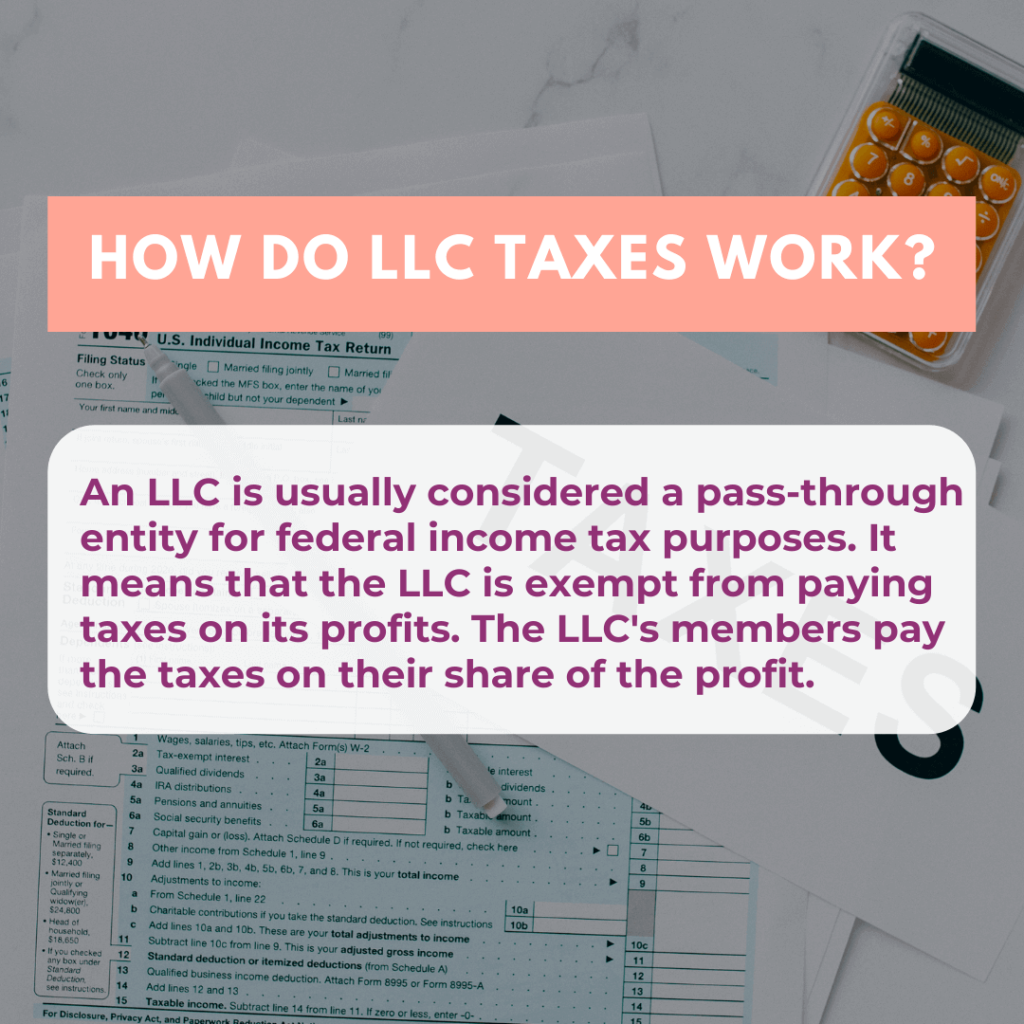Do you want to form a limited liability company (LLC), or do you already have one? However, the thought of doing your taxes haunts you. However, don’t let the idea of figuring out your LLC taxes stop you from continuing forward with your firm.
We can assist you in getting there. We’ve put together this beginner’s guide to understanding how LLC taxes work so that you can put your worries aside, get down to business, and learn how to handle your taxes correctly so that your company can prosper.
How do LLC taxes work?
An LLC is usually considered a pass-through entity for federal income tax purposes. It means that the LLC is exempt from paying taxes on its profits. The LLC’s members pay the taxes on their share of the profit. Members can also decide to tax the LLC as a corporation rather than a pass-through entity.

LLC taxes come in a variety of forms. All members are responsible for paying income tax and self-employment taxes on any income received from the LLC. The members might also be responsible for payroll taxes and sales taxes, depending on what they sell and whether or not they hire employees.
To make matters even more complex, an LLC can decide to be taxed as a separate business entity. Knowing your tax liability ahead of time might help you make better financial decisions.
Income taxes
Based on the number of members in your LLC, the IRS recognizes it as a sole proprietorship or a partnership. If you’ve previously operated as a sole proprietorship or partnership, you’re already ahead of the game because you’re familiar with many rules. If you’re not sure, here’s what you need to know:
Single-owner LLCs income taxes
For tax reasons, the IRS treats one-member LLCs as sole proprietorships. The LLC does not have to pay taxes or file a tax return with the IRS.
You must declare all LLC profits (or losses) on Schedule C and provide it with your 1040 tax return as the sole owner. Even if you leave profits in the business bank account at the end of the year to meet future expenses or develop the business, you must pay taxes on them.
Multi-member LLC income taxes
For federal income tax purposes, multi-member LLCs are considered pass-through entities. It is similar to a single-member LLC in that the LLC does not pay its taxes. Instead, each member pays taxes on the LLC’s earnings in proportion to their ownership stake. As a result, each member’s tax bracket determines the LLC tax rate.
For instance, if two members of an LLC each hold 50% of the company, each owner is responsible for half of the revenues. Each owner is also entitled to half of the LLC’s tax deductions and credits and the ability to deduct half of the losses. This tax operates in a similar way to a partnership.
A multi-member LLC must file various tax forms with the IRS, particularly Form 1065, U.S. Return of Partnership Income- an informational return that they must file annually with the IRS.
The LLC must also submit each owner with a completed Schedule K-1 by March 15 of each year. Schedule K-1 summarizes each owner’s contribution to LLC revenue, losses, credits, and deductions. Each owner must attach their Schedule K-1 to their income tax return filed with the IRS.
State Income Taxes
You’ll also have to file state income tax to report LLC revenue. Check your state’s regulations for deadlines, required tax forms, and fines. In some states, you may be responsible for paying annual filing costs, which you do not want to overlook.
In California, for example, forming a Limited Liability Company is costly. The state charges a minimum annual filing cost of $800. Your annual filing fee will be greater if your company earns more than $250,000 — up to $11,790 for corporations earning $5 million or more.
Self-Employment Taxes
Even though members of an LLC are not considered workers, the SECA (Self Employment Contributions Act) requires that your LLC tax responsibilities include the social security and Medicare taxes you owe to the IRS. These taxes need to be paid directly to the IRS in self-employment taxes.
Self-employment income is taxed at 15.3 percent up to a certain annual threshold. It includes the following:
- 12.4 percent social security tax on earnings up to $137,700
- 2.9 percent Medicare tax on all earnings
- 0.9 percent Medicare surtax on earnings over $200,000
Schedule SE is the form that will assist you in calculating your LLC’s self-employment tax liability. You should include this schedule in your tax return.
Sales tax
LLCs may be liable for collecting sales tax on the products and services they offer, in addition to state and federal tax requirements. In the instance of an LLC, its members are responsible for collecting and delivering any applicable sales taxes to the appropriate parties.
Company owners must remain updated on tax developments and rate changes because sales tax rates and policies differ from state to state.
Additionally, LLCs should be aware that they may be subject to different sales tax collection laws if they sell to out-of-state clients. If you have any complications with your responsibilities, don’t hesitate to contact a local CPA.
Final Thoughts
You may feel more confident about moving forward with your company now that you better understand the basic of paying taxes as an LLC.
With all of the overlapping and complexities, LLC taxes can easily lead to turmoil and tax default, and the only way to avoid this is to be well-prepared and structured. You should also ensure your bookkeeping, accounting, and auditing are all done correctly. It will also ensure that you fill-up the necessary documents and pay the correct amount of LLC taxes on time.






